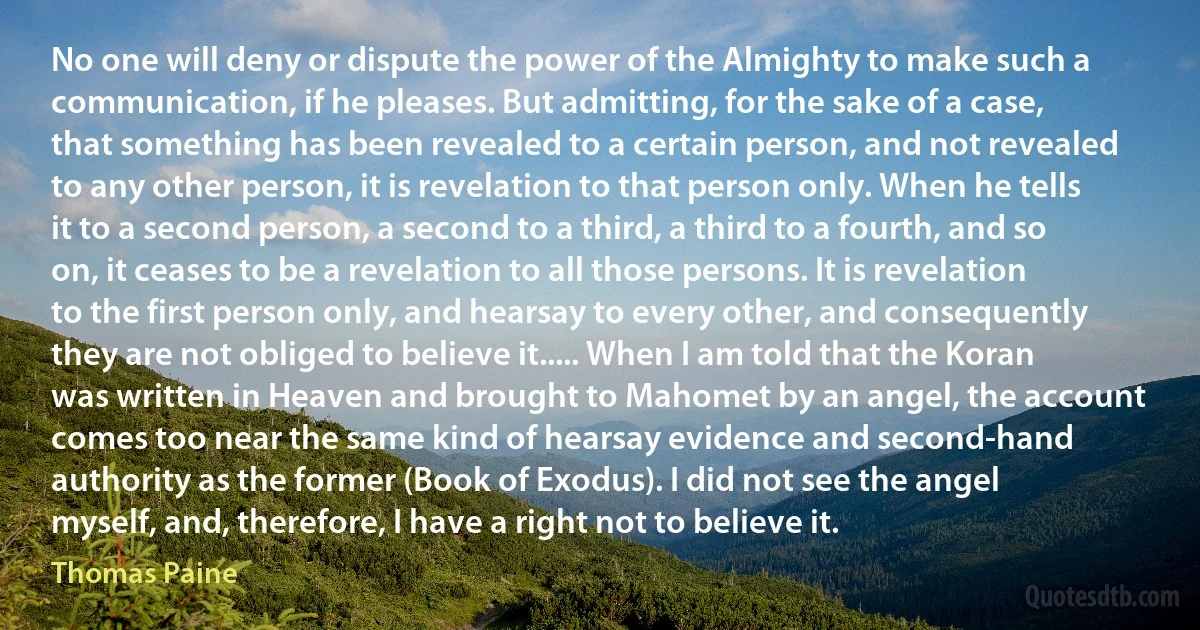
No one will deny or dispute the power of the Almighty to make such a communication, if he pleases. But admitting, for the sake of a case, that something has been revealed to a certain person, and not revealed to any other person, it is revelation to that person only. When he tells it to a second person, a second to a third, a third to a fourth, and so on, it ceases to be a revelation to all those persons. It is revelation to the first person only, and hearsay to every other, and consequently they are not obliged to believe it..... When I am told that the Koran was written in Heaven and brought to Mahomet by an angel, the account comes too near the same kind of hearsay evidence and second-hand authority as the former (Book of Exodus). I did not see the angel myself, and, therefore, I have a right not to believe it.
Thomas PaineRelated topics
account angel authority believe book case certain comes communication exodus heaven kind koran near person power right sake second see something tell third writeRelated quotes
Carolina or Virginia may try to break away. In the effort it may destroy its local government as it has now destroyed it, except by successful revolution no rebellious state can escape the jurisdiction, and it will be reorganized exclusively by the national authority of the United States of America. This is what Gettysburg roars and Vicksburg and Port Royal. This is the thunder of the Kearsarge as she sinks the Alabama, This is the song of Sherman's march to the sea; and Lee's surrender, the fall of Richmond, and the universal crash of the rebellion mutter and murmur their reluctant 'Amen, Amen'. But, at the same moment that the profound sense of nationality and the power of the nation are revealed, the national mind has gained a clear perception of the relation of morals and politics, the strict dependence of civil order and national prosperity upon morality.

George William Curtis
If it was possible for men who exercise their reason, to believe that the divine Author of our existence intended a part of the human race to hold an absolute property in, and an unbounded power over others, marked out by his infinite goodness and wisdom, as the objects of a legal domination never rightfully resistible, however severe and oppressive, the inhabitants of these Colonies might at least require from the Parliament of Great Britain some evidence, that this dreadful authority over them has been granted to that body. But a reverence for our great Creator, principles of humanity, and the dictates of common sense, must convince all those who reflect upon the subject, that Government was instituted to promote the welfare of mankind, and ought to be administered for the attainment of that end.

John Dickinson (delegate)
The Age that admires talk so much can have little discernment for inarticulate work, or for anything that is deep and genuine. Nobody, or hardly anybody, having in himself an earnest sense for truth, how can anybody recognize an inarticulate Veracity, or Nature-fact of any kind; a Human Doer especially, who is the most complex, profound, and inarticulate of all Nature's Facts? Nobody can recognize him: till once he is patented, get some public stamp of authenticity, and has been articulately proclaimed, and asserted to be a Doer. To the worshipper of talk, such a one is a sealed book. An excellent human soul, direct from Heaven,-how shall any excellence of man become recognizable to this unfortunate? Not except by announcing and placarding itself as excellent,-which, I reckon, it above other things will probably be in no great haste to do.

Thomas Carlyle
I gave up on this stuff. I gave up on my species and ... I gave up on my countrymen. Because I think we squandered great gifts. I think humans were given great great gifts: walking upright, binocular vision, opposable thumb, large brain ... We grew. We had great gifts, and we gave it all up for both money and God ... We gave it all up to superstition, primitive superstition, primitive shit ... Invisible man in the sky, looking down, keeping track of what we do, make sure we don't do the wrong thing, if we do, he puts us in hell, where we burn forever. That kind of shit is very limiting for this brain we have. So we keep ourselves limited. And then we want a toy and a gizmo and gold and we want shiny things, and we want something to plug in that will make big big big things for us... And all that shit is nothing! It's nothing.

George Carlin
For what advantage is it, that the world enjoys profound peace, if thou art at war with thyself? This then is the peace we should keep. If we have it, nothing from without will be able to harm us. And to this end the public peace contributes no little: whence it is said, ‘That we may lead a quiet and peaceable life.' But if any one is disturbed when there is quiet, he is a miserable creature. Seest thou that He speaks of this peace which I call the third (inner, ed.) kind? Therefore when he has said, ‘that we may lead a quiet and peaceable life,' he does not stop there, but adds ‘in all godliness and honesty.' But we cannot live in godliness and honesty, unless that peace be established. For when curious reasonings disturb our faith, what peace is there? or when spirits of uncleanness, what peace is there?

John Chrysostom
